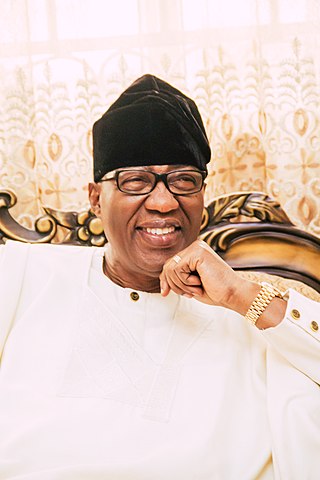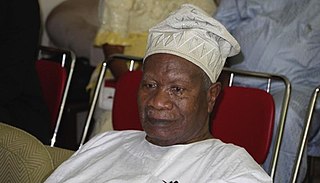
Gbenga Daniel is a Nigerian politician and Governor of Ogun State of Nigeria from 29 May 2003 to 29 May 2011. He is the owner of Kresta Laurel, an Electro-mechanical Engineering company, he started in 1990. He is also the Founder of Conference Hotels with branches in Ijebu-Ode, Sagamu, Abeokuta and Isheri part of Lagos.
The Action Group (AG) was a Nigerian nationalist political party established in Ibadan on 21st March 1951, by Chief Obafemi Awolowo. The party was founded to serve as the platform for realizing his preliminary objective of mobilizing Western Nigerians to forestall the NCNC control of the Western Region and the subsequent aim of cooperating with other nationalist parties to win independence for Nigeria. It benefited immensely from the relationships developed in the Egbe Omo Oduduwa formed in Awolowo's days in London as a student.
Crispin Curtis Adeniyi-Jonespronunciation (1876–1957) was a Nigerian medical doctor of Sierra Leonean heritage and the pioneer director of the Yaba asylum. He became one of Nigeria's foremost nationalists as a member and later president of the Nigerian National Democratic Party. He was also a long-standing member of the legislative council of Nigeria and served in the council from 1923-1938. Apart from his political activities, he also teamed up with Winifred Tete-Ansa of the National Congress of British West Africa to formulate economic policies to alleviate some of the emerging economic problems in colonial West Africa.

Oloye Sir Samuel Layinka Ayodeji Manuwa, CMG, OBE, M.D. (1903–1976) was a pioneering Nigerian surgeon, Inspector General of Medical Services and former Chief Medical Adviser to the Federal Government of Nigeria. He was the first Nigerian to pass the FRCS and he obtained the postgraduate Doctor of Medicine degree from the University of Edinburgh in 1934. In 1966, he was elected president of the World Federation for Mental Health.

Chief Moses Adekoyejo MajekodunmiListen C.F.R, C.M.G. was a Nigerian gynaecologist and obstetrician. He was also Minister of Health in the Nigerian First Republic.
Chief Oguntola Odunbaku Sapara M.D. was a Yoruba doctor, originally from Sierra Leone, who spent most of his career and life in Nigeria. He was best known for his campaign against smallpox.

Samuel Akisanya, was a Nigerian trade unionist and nationalist based in Lagos, Nigeria during the colonial era, one of the founders of the Nigerian Youth Movement. He was also the Oba of Isara, an office which he held from 1941 until his death. He is today widely regarded as the greatest king in the history of the city.

The Saro, or Nigerian Creoles of the 19th and early 20th centuries, were Africans that were emancipated and initially resettled in Freetown, Sierra Leone by the Royal Navy, which, with the West Africa Squadron, enforced the abolition of the international slave trade after the British Parliament passed the Slave Trade Act 1807. Those freedmen who migrated back to Nigeria from Sierra Leone, over several generations starting from the 1830s, became known locally as Saro(elided form of Sierra Leone, from the Yoruba sàró). Consequently, the Saro are culturally descended from Sierra Leone Creoles, with ancestral roots to the Yoruba people of Nigeria.
Methodist Boys High School, Lagos is a secondary school for boys located in Victoria Island, Lagos. Nigeria. Founded in 1878, it was the second secondary school established in Nigeria.
John Randle was a West African doctor who was active in politics in Lagos, now in Nigeria, in the colonial era. Born in Sierra Leone, he was one of the first West Africans to qualify as a doctor in the United Kingdom. On return he worked for the Lagos Colony colonial medical service for a while, then left due to discrimination and built up a successful private practice, treating both Europeans and Africans. He co-founded the People's Union in 1908, a political association that sometimes opposed government measures. During World War I (1914–18) he was loyal to the British Empire. In post-war politics the conservative People's Union was not a serious competitor to the more radical Nigerian National Democratic Party.
Orisadipe Obasa,Listen M.D. was a Nigerian doctor and prince who played a significant role in the politics of Lagos in the first decades of the 20th century.

A by-election was held for the Lagos seat in the Legislative Council of Nigeria on 5 March 1941. It was required after the incumbent member Kofo Abayomi of the Nigerian Youth Movement (NYM) resigned in order to move the United Kingdom to take up a Rhodes Scholarship in ophthalmology. Although Ernest Ikoli of the NYM was elected with 56% of the vote, the controversy caused by the election led to the eventual demise of the party.
This is a Chinese name; the family name is Xin.

Bolaji Akinola is a Nigerian maritime and corporate communication expert. He holds a Doctor of Philosophy degree in Media and Communication from the Pan-Atlantic University, Lagos and a Masters in Business Administration he obtained from Lagos Business School.
Lola Maja, also known as Lola Maja-Okojevoh, is a Nigerian make-up artist; her specialties include special effects, eyebrows and eyelashes. She is the founder and Chief Executive Officer of "Sacred Beauty" & "The SFX Store". She is known for working on several major fashion events and on major films such as The Figurine and October 1, as well as several music videos. She has done make-up for celebrities, including Genevieve Nnaji and Tiwa Savage. She has also worked with major fashion magazines, such as Style Mania and FAB, as well as models like Iman and Tyson Beckford. In 2015, she won the "Best Make-up" Africa Magic Viewers Choice Award for October 1.
Chief Joseph Kosoniola Randle MVO MBE was a Nigerian businessman and socialite from Lagos. He was Chef de Mission of the Nigerian Olympic team to Melbourne and was connected to various public activities in Lagos. Randle was a social crusader and philanthropist who started the Nigerian arm of the Anti-Tuberculosis Society, a member of the Lagos Town Council and was a sportsman who was a trustee of a proposed National Stadium.
Adewale Maja-Pearce is an Anglo-Nigerian writer, journalist and literary critic, who is best known for his documentary essays. He is the author of several books, including the memoirs In My Father's Country (1987) and The House My Father Built (2014), several other non-fiction titles and a collection of short stories entitled Loyalties and Other Stories (1986).
Ìyál'ọ́jà is a Yoruba word that literally translates to "Mother of the Market". However, it has more commonly been used to refer to a prominent traditional chieftaincy title among the Yoruba people.
Musa Yar'Adua was a Nigerian administrator and politician who served as the Minister of Lagos Affairs during Nigeria's First Republic. Yar'Adua was minister when Lagos Island and the capital territory was designated as the city of Lagos in 1963. He is the father of Umaru Musa Yar'adua, Nigeria's 13th president, and Shehu Musa Yar'adua, Chief of Staff of Obasanjo's military government.
Chief Abiola Dosunmu, is a Nigerian businesswoman, socialite and traditional aristocrat. In addition to a variety of other chieftaincy titles, she currently holds that of the Erelu Kuti IV of Lagos.

![]() Listen was a Nigerian medical doctor, businessman, philanthropist and politician who was president of the Nigerian Youth Movement from 1944 to 1951. He later became president of the Egbe Omo Oduduwa in 1953. [1]
Listen was a Nigerian medical doctor, businessman, philanthropist and politician who was president of the Nigerian Youth Movement from 1944 to 1951. He later became president of the Egbe Omo Oduduwa in 1953. [1] 





